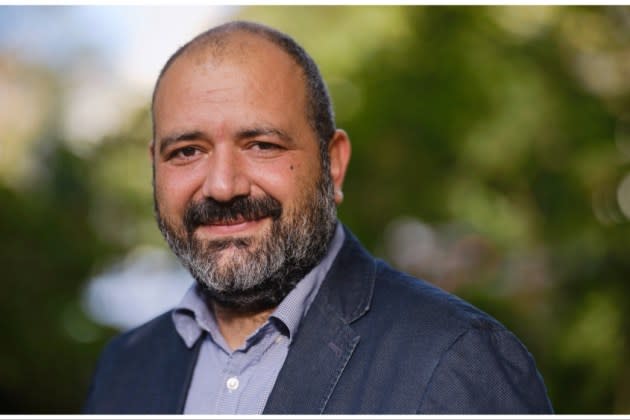IDFA Artistic Director Orwa Nyrabia on the Intersection of Politics and Cinema: ‘No Festival Can Escape the Fact That It Is Also a Political Activity’

For the second year in a row, the International Documentary Film Festival Amsterdam (IDFA) launches against the backdrop of a major war. Last year, the festival took place at the height of Russia’s attacks on Ukraine, this year it runs as the Israel-Hamas War rages. Asked about the significance of IDFA being an openly political festival, artistic director Orwa Nyrabia says it is “very important to our filmmaking community, to our audiences and to our festival team and staff.”
Speaking to Variety just before the opening of the festival’s 36th edition, which runs Nov. 8-19, Nyrabia highlights how people are currently trying “not to take sides in a cheap way, to understand more and to discuss better.” The artistic director opened the festival’s press conference by acknowledging the fighting in Israel and Gaza, and emphasizing how he believed “this would have been much better” if we “all listened” to filmmakers who shared their vision of the escalating conflicts in the region.
More from Variety
“I was very serious when I mentioned in the press conference that, to me, this is what documentary filmmakers have been doing,” he says. “It’s a responsibility toward them to acknowledge that they saw this coming. That’s what a documentary film festival — any film festival — is about, really. No festival can escape the fact that it is also a political activity and it shapes opinion.”
This year’s edition opens with the world premiere of Olga Chernykh’s “A Picture to Remember,” an essay-style account of the Ukraine War from the perspective of three generations of women living in the country. “It’s a deeply moving, very well-made film. And that’s what makes a brilliant opener,” says Nyrabia, reinforcing the film’s humanity and Chernykh’s ability to turn the personal into the universal. Of having a Ukrainian film open this year’s festival, Nyrabia is categoric: “It’s a very special film and I don’t want us to take away the importance of the talent and hard work of the filmmaker and think that this is only a political choice. It is a political choice but it is not just that.”
Also categoric is Nyrabia’s firm belief in IDFA’s mission of championing diverse voices from all corners of the world. When asked about how difficult it is to do as such when the market often lacks space for such talent, he says IDFA’s model is “not a utopia.”
He adds: “Most of these very talented filmmakers don’t even get the chance to be rejected, they are immediately put aside. It’s very easy to show them that we see what they are doing.” Nyrabia concludes by saying that despite many films eventually not having the “potential” to score U.S. distribution deals, this “does not discard the amazing value of their work.”
Another way IDFA is trying to level the playing field is through its recently inaugurated home at Vondelpark, a historical building in the heart of Amsterdam that will host activities and screenings year-round. “We just opened our cinema at a time when the whole theatrical experience is deeply endangered,” he says. “And we do this because I think that’s the role of an institute like IDFA. Our role is to make sure that the market economy is not the only factor that controls what people get to see and how they get to meet and discuss art and filmmaking.”
“We have this possibility as a non-profit documentary-dedicated institution to think of an alternative economy where we can imagine different interactions between film and society. We make sure our business model is not based on ticket sales and, this way, maybe we can in a very small, very humble way, shake the waters a bit,” he continues.
One other novelty at this year’s festival is the Signed strand, taking the place of the former Masters section and described as the “latest films by the most interesting contemporary filmmakers whose filmographies we highly appreciate, and for whose work we wait with excitement.” This year’s inaugural selection features work by Maite Alberdi, Cao Guimarães, Steve McQueen and Claire Simon. On revamping the section, Nyrabia says it came out of the whole notion that Masters “came from a different era where it was only about men from certain parts of the world getting all the opportunities and the only ones who could become iconic.”
“This is the kind of understanding that allows Tatiana Huezo to get her rightful place next to Frederick Wiseman,” Nyrabia adds. “This is why the section was entirely revamped so that it feels, looks and smells like our moment. We’re not into glorification, we’re into acknowledgement.”
When asked about the Hollywood strikes and how questions about things such as artificial intelligence might be knocking on his door at IDFA, Nyrabia promptly says he is “always on the side of the strikes” before explaining that it is “very different between documentary and fiction because our currency is not star power.”
“Filmmakers in Europe are usually underpaid,” he continues. “I think Europe and the rest of the world are slower in internalizing technology than the U.S. and China, so AI has not yet gone in a critical way into scriptwriting and acting in Europe. This is why the strikes are very important because they are American and have a very U.S. context, but they will be the blueprint for the future of similar disputes in other parts of the world. The striking unions in the U.S. have much more responsibility on their shoulders than they know.”
Best of Variety
Sign up for Variety’s Newsletter. For the latest news, follow us on Facebook, Twitter, and Instagram.
